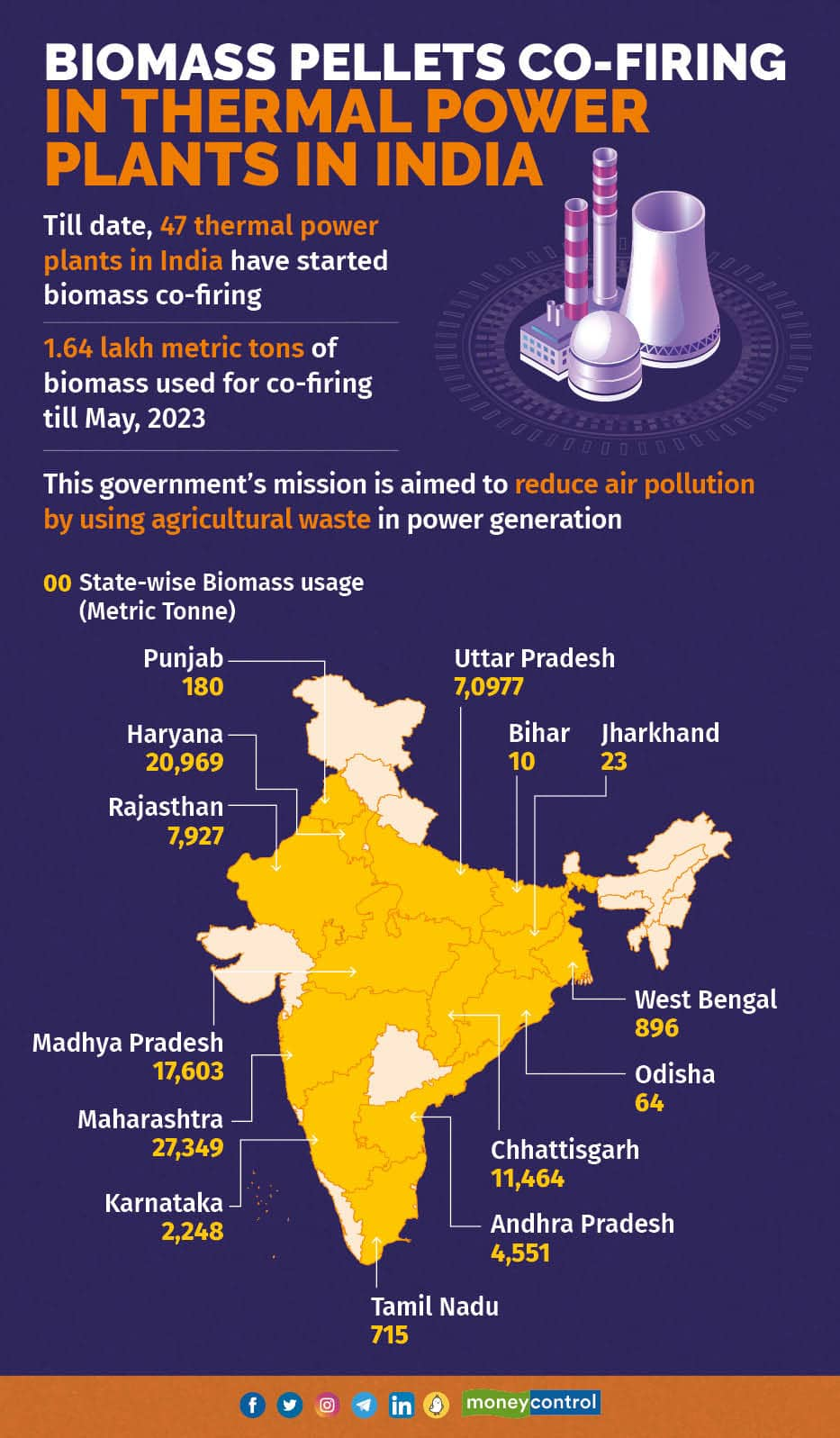



Faced with supply chain issues in the availability of biomass pellets, the Union government has eased its mandate for co-firing agricultural residue in coal-fired thermal plants for the time being.
On October 8, 2021, the government, on the recommendation of the Commission for Air Quality Management (CAQM), had first mandated all coal-fired power plants to blend 5-10 percent biomass pellets of their total plant capacity. The mandate was later revised to 5-7 percent.
But now, the government has fixed the mandate at 5 percent and has also postponed its formal implementation to the next financial year. "The Ministry of Power modified the rule on June 16, 2023 and it now mandates 5 percent biomass co-firing in Thermal Power Plants (TPPs) from FY 2024-25. This obligation, however, shall increase to 7 percent from FY 2025-26, as per the revised policy," the power ministry informed the Parliament on August 2.
 Biomass pellet utilisation in coal-fired power plants in different states till May, 2023.
Biomass pellet utilisation in coal-fired power plants in different states till May, 2023.Union Minister for Power and Renewable Energy RK Singh on August 4 acknowledged that the government's mission for co-firing of agricultural residue in thermal power plants has seen a slow progress due to supply chain issues.
ALSO READ: Govt to benchmark prices of biomass pellets, forms committee under CEA“The problem is that sufficient quantity of biomass pellet is not available in the country as of now. We have had multiple bids by TPPs for procurement of biomass pellets, but a number of them had to be cancelled due to low availability,” Singh said on the sidelines of a media interaction on the achievements of the Modi government in the infrastructure sector in New Delhi on August 4.
Data accessed by Moneycontrol showed that at 5 percent mandatory blending, TPPs in India would need at least 35 million metric tons per annum of biomass pellets. India generates about 750 million metric tons of biomass annually currently, of which 230 million metric ton is surplus which can be used for pellet manufacturing.
On a daily basis, India needs 100,000 metric tons of biomass pellets per day for co-firing at TPPs. But against that, the country currently has a manufacturing capacity of only about 8,000 metric tons a day.
The Union minister said the government has also initiated a programme for providing financial assistance in biomass pellet manufacturing. Biomass pellet manufacturing mostly has to be taken up by Micro, Small and Medium Enterprises (MSMEs) as currently there are no big players.
Singh said the government is also planning to offer feed-in tariff for biomass pellet to ensure demand stability. On June 27, the government said it is going to go ahead with benchmarking the prices of biomass pellets used for co-firing in TPPs. Price benchmarking of biomass pellets is being taken up because at present there is wide variation in the prices quoted by pellet vendors which often results in failed contracts with gencos. As a result, neither vendors are able to sell their pellets, nor gencos are able to buy in large quantities.
The biomass co-firing policy has been introduced to address the twin challenges of curbing pollution from burning crop residue and emissions from coal power plants.
CAQM chairperson and retired bureaucrat MM Kutty expressed his dissatisfaction over the slow progress of the National Biomass Mission in an event organised by the Ministry of Power, in March this year.
“If you see the statistics, it is very painful. For the last 13-month period, from January 1, 2022 to January 31, 2023, the total amount of biomass co-firing is just 6,770 metric tons. Out of this, 6,373 metric tons (94 percent) of co-firing happened only in three plants, of which two were of NTPC. It clearly says that the remaining eight power plants have not done much to initiate co-firing in their plants," Kutty said on March 24.
It was the CAQM which had first directed the 11 thermal power plants which are within 300 km radius of Delhi to start co-firing biomass pellets. The government, later expanded the mandate to all TPPs across the country. The mandate to use agriculture residue was put because of the stubble burning menace in Punjab and Haryana between September and November, which causes air pollution in Delhi-NCR to spike to severe levels.
To be sure, biomass pellet co-firing at TPPs is happening even now, but in a subdued manner with most of the plants still not implementing it. Eventually, the government aims to impose a penalty on TPPs defaulting in their obligation as per the amended Environment Conservation Act. “But for now, we are focusing on fixing the supply chain of biomass pellets, which is very important,” a senior official from the mission said.
Discover the latest Business News, Sensex, and Nifty updates. Obtain Personal Finance insights, tax queries, and expert opinions on Moneycontrol or download the Moneycontrol App to stay updated!